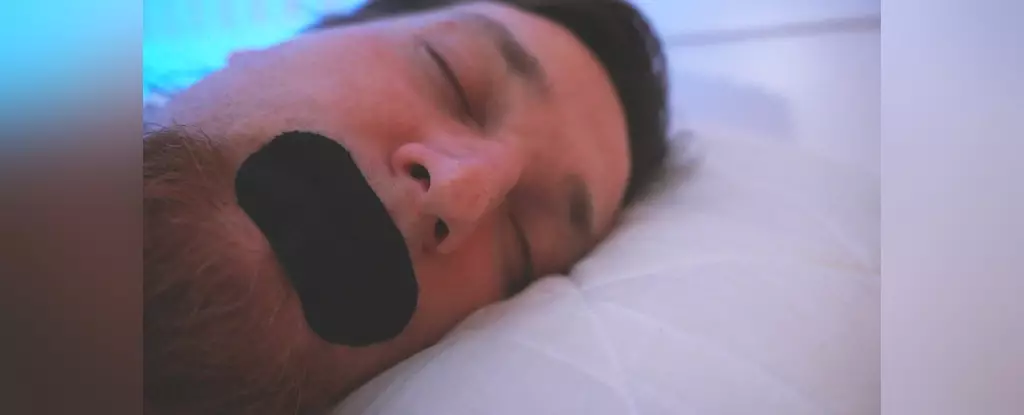In a world where instant gratification is the norm, social media often brings forth trends that promise miraculous transformations with minimal effort—like the practice of mouth taping during sleep. This intriguing technique has surged in popularity, buoyed by anecdotes from influencers claiming it enhances everything from jawlines to sleep quality. While these statements may sound appealing, they gloss over a critical aspect: the importance of scientific validation. It is vital to scrutinize trends like mouth taping before jumping on the bandwagon, especially when they pertain to health and well-being.
The Science Behind Mouth Breathing
Mouth breathing isn’t merely a quirky trait; it is often symptomatic of underlying health issues such as obstructive sleep apnea, nasal obstructions, or even chronic sinusitis. Each of these conditions can have serious implications for an individual’s health, compounded by the potential risks of simply taping one’s mouth shut. Ironically, while some practitioners tout mouth taping as a remedy for sleep-related issues, it can lead to dangerous outcomes in those with nasal blockages. If the airway is compromised, forcing oneself to breathe solely through the mouth can exacerbate the situation, leading to asphyxiation or further sleep disturbances.
The Research Landscape
An examination of the scientific literature reveals substantial gaps in the existing research on mouth taping. Ten prominent studies, the best that researchers could gather on the topic, exhibited critical deficiencies such as lack of comprehensive follow-up, non-representative participant groups, and failure to address confounding factors that could skew results. Although a handful of studies indicated improvements in patients with mild obstructive sleep apnea, the vast majority failed to substantiate the claims made on social media platforms, indicating anecdotal wisdom doesn’t hold up to empirical scrutiny. These findings highlight a clear danger: adopting untested remedies based purely on social media buzz can steer individuals away from genuinely effective treatments.
Potential Risks vs. Nonexistent Benefits
Understanding the finer points of these studies is crucial. For those experiencing mild sleep apnea, mouth taping may present marginal benefits, particularly in regulating breathing patterns during sleep. However, for individuals with other underlying issues—like a deviated septum or nasal polyps—the approach may not just be ineffective, but potentially hazardous. The studies combined have raised alarm bells, emphasizing that the resolve to fix one problem shouldn’t come at the expense of worsening another.
Moreover, advocates for mouth taping either do not consider or dismiss an essential fact: addressing the root causes of mouth breathing matters far more than any quick follow-up treatment. Instead of masking a problem with tape, individuals should seek proper diagnosis and treatment recommendations from healthcare professionals, particularly an ear, nose, and throat (ENT) specialist.
The Critical Role of Professional Guidance
It has never been truer that, when it comes to health advice, some solutions are better than others. Despite the alluring simplicity of taping one’s mouth shut to induce a perfect night’s sleep, the need for a comprehensive assessment and actionable treatment plan should never be underestimated. Experts in sleep medicine can offer tailored strategies suited to the individual’s needs, ensuring that health is prioritized.
Ignoring the rigorous approach of consulting professionals opens individuals up to misinformation. This is especially concerning in a society saturated with wellness trends that often prioritize viral appeal over genuine efficacy. The allure of a DIY solution can lead many down a path that ultimately prolongs their sleep disorders.
In sum, while mouth taping may appeal as a simple bedtime hack to alleviate sleep issues, it invites a multitude of risks and uncertainties. It is crucial to adopt a more discerning attitude toward health interventions, one that favors empirical evidence and medical wisdom over fleeting social media trends. Opting for a proper diagnosis through medical channels is the only sensible course of action in the quest for restorative sleep and overall well-being.

